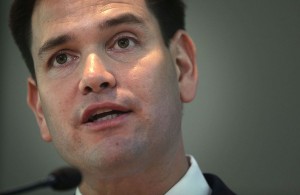Immigration reform staggers on
Published on November 26th, 2013
By Jennifer Rubin
November 26, 2013
Washington Post
As much as right-wing opponents would like to kill it and as much as liberals would love it to fail so they can blame Republicans, immigration reform is not, by any means, dead. The speaker of the House said they’d definitively get to it. The president is willing to see the House carve up a comprehensive bill into manageable pieces. But what about the voters? CNN reports:
A Public Religion Research Institute survey released Monday (but conducted earlier this month) indicates 63% of adults nationwide favor allowing undocumented immigrants to become citizens if they meet certain requirements. Another 14% prefer they become legal residents only, while 18% support the idea of deporting those who came to the United States illegally. Four percent are unsure or did not give an answer. . . . According to a Quinnipiac University survey from earlier in November, 57% of registered voters nationwide support a pathway to citizenship, while 13% say undocumented immigrants should be allowed to stay but not become citizens.
While voters don’t consider immigration an urgent, top priority, they nevertheless are overwhelmingly in favor of an earned citizenship plan. Republican support for an earned path is also high. (“Roughly 6-in-10 Republicans (60%) and independents (57%) and approximately 7-in- 10 (73%) Democrats favor a path to citizenship for immigrants currently living in the United States illegally.”) When the details of a comprehensive plan are explained support goes even higher for respondents. (“When the question references specific requirements such as paying back taxes, learning English, and passing a background check, 71% support a path to citizenship.”)
The other factor in the mix weighing in favor of earned citizenship are the 2016 contenders. The governors widely considered potential candidates as well as Rep. Paul Ryan (R-Wis.) and Sen. Marco Rubio (R-Fla.) favor some sort of compromise plan including a pathway to citizenship. Wisconsin Gov. Scott Walker is the latest to weight in, saying in a D.C. breakfast meeting with journalists, “From an immigration standpoint, it is simple . . . If you want to come into America today legally, it is very, very difficult, from my point of view, to do so on a timely basis… We should be finding a way for that to be easier to do in the United States. . . . For me, I would open the door to making sure people can come legally to this country. People who want to live the American dream are exactly the kind of people this country was based on.”
Could the forces align for some sort of immigration deal? The barriers are still high. The president has a knack for pushing the two sides apart. Right-wing demagogues delight in obstructing compromise and in convincing lawmakers that the shrill anti-immigration voices are in the majority in the GOP. One suspects that if this is to be done, House leadership and Senate brokers like Chuck Schumer (D-N.Y.) will need to grab the reins and take charge if they are to overcome inertia, hecklers outside Congress and a president who couldn’t make a bipartisan deal if his presidency depended on it. Senate Democrats might want an accomplishment to run on while House Republicans may decide now is the time to put the issue to bed, get some credit and remove a barrier to expanding the party’s appeal.





